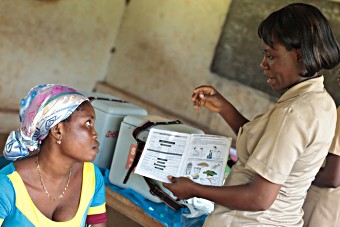
Mercy Ahun
GAVI’s Special Representative to GAVI Eligible Countries

Photo credit: GAVI/2012/Olivier Asselin
I accompanied GAVI CEO, Dr Seth Berkley, on a joint country visit with Bill Gates to Ghana two weeks ago. This was Mr Gates' first visit to the Ghana Health Service.
We spent our first morning in the field, visiting the Community-based Health Planning & Services initiative’s compound, which is part of the strategy for changing primary health care from a focus on clinical care at district and sub-district levels to a new focus on high quality services at community and doorstep locations.
The Community Health Officers were working at an outreach clinic, under a shady tree providing some cover from the hot sun. They showed us their child registers and 'Well Baby Clinic' cards with records of vaccinations, weight and other relevant child health records. This particular district is also using mobile phone technology to register pregnant women. Regular messages, including vaccination appointments are sent in the local language to mothers.
The Community Health Officers use this mobile technology to generate a list of expected clients and defaulters for follow up. They also use paper systems of child health cards and registers as well as logbooks in clinics to track a child’s progress with vaccinations.
Mr Gates witnessed real progress in using the paper system and the culture of data that it supports. For example, the district holds regular monthly meetings to validate data before it is shared with higher levels.
At the end of the day, the health workers were happy with Mr Gates summary of the visit: "The system is not perfect but it works."
I was reminded of his words in subsequent conversations I had with family and friends the following week. My cousin, a dermatologist, praised the Community Health Officers for the way they keep and use immunisation data. Monthly inter-district review meetings were opportunities to share best practices and validate data on reproductive and child health including immunisation. She wished clinical services were as organised as the preventive services organised by the Community Health Officers.
At a subsequent dinner organised by some retired public health colleagues, one of them described how medical students he examined could not remember the last time they saw a case of clinical measles. He spoke eloquently about the dedication of Community Health Officers at peripheral levels of the health care system in bringing services including immunisation to communities. Countries unhampered by the scourge of vaccine preventable diseases can rise to their full developmental potential, he said.
More should be done by the Ghana Health Service and development organisations to publicise how we are contributing to national prosperity. Strong primary health care systems are the bedrock of successful immunisation programmes, which ultimately contributes to saving lives.
